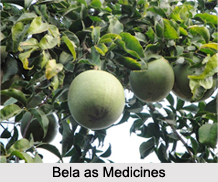 Bela, botanically known as Aegle Marmelos, is held in great veneration by the Hindus. It is sacred to Lord Shiva whose worship cannot be accomplished without its leaves. Hence this tree is always met with near temples dedicated to Lord Shiva. It is incumbent on all Hindus to cultivate and cherish this tree, and it is sacrilegious to up-root or cut it down. The Hindu, who expires under a bela tree, accepts to obtain immediate salvation, not with-standing that he may have committed innumerable sins.
Bela, botanically known as Aegle Marmelos, is held in great veneration by the Hindus. It is sacred to Lord Shiva whose worship cannot be accomplished without its leaves. Hence this tree is always met with near temples dedicated to Lord Shiva. It is incumbent on all Hindus to cultivate and cherish this tree, and it is sacrilegious to up-root or cut it down. The Hindu, who expires under a bela tree, accepts to obtain immediate salvation, not with-standing that he may have committed innumerable sins.
Health Benefits of Bela
The Aegle Marmelos is used in medicine in a variety of ways. The unripe or half ripe fruit is regarded as astringent, digestive and stomachic and as useful in restraining discharges from the alimentary canal. The ripe fruit is described as sweet, aromatic, cooling and laxative. It is not easily digested and has a tendency to cause flatulence. The dried pulp of the fruit, called "Vilva Peshika" in Sanskrit, is regained as astringent and specific for dysentery. The root-bark is considered useful in diseases supposed to be caused by deranged air. It constitutes an ingredient of Dasamul or the ten roots. The fresh juice of the leaves is given with honey as a domestic laxative and febrifuge.
Dose of Bela in Medicine
The dried pulp of the fruit is given with treacle, in recent dysentery with griping, pain in the loins and costiveness. A compound powder is prepared with equal parts of dried bela, tubers of Cyperus rotundus (mustaka), flowers of Woodfordia floribunda (dhataki), root of Stephania hernandifolia (patha), ginger and Mocha Rasa. It is given in doses of 22 to 42 grains with buttermilk and treacle.
In the dysentery of children, a decoction and an electuary of the following drugs is used, namely dried bela, fruits of Pothos officinalis (gajapippuli), root of Pavonia odorata (bala), flowers of Woodfordia floribunda (dhataki), and bark of Symplocos racemosa (lodhra), in equal parts. A decoction of the root of Aegle Marmelos is given with sugar and fried rice, for checking diarrhoea and gastric irritability in infants.
The fresh juice of the leaves is given, with the addition of black pepper, in anasarca with costiveness and jaundice. In external inflammations, the juice of the leaves is given internally, to remove the supposed derangement of the humours.
Vilva Taila
"Vilva Taila" is a preparation used in chronic diarrhoea and dysentery with loss of appetite and infections of the throat. To prepare this; take dried pulp of bela fruit, flowers of Woodfordia floribunda (dhataki), ajmad and long pepper, each 3 parts, black pepper, cumin seeds, coriander, long pepper root, root of Pavonia odorata (bala), sonchal salt, ajwain, cardamoms, cinnamon, tejapatra, flowers of Mesua ferrea (Nagakesara), ginger and plumbago root, each one part, powder the ingredients finely and mix. Dose should be about one drachm.
Related Articles
Ayurveda
Ayurveda Medication
Elements of Ayurveda
Concepts of Ayurveda
Ancient Literature of Ayurveda
Sushruta Samhita




















